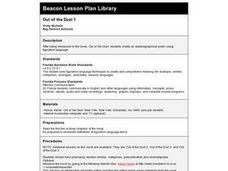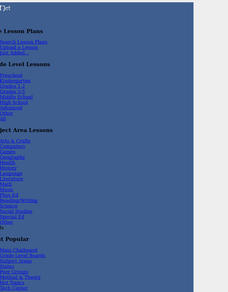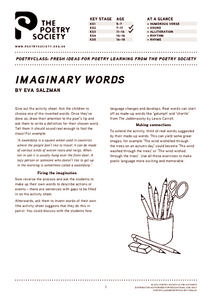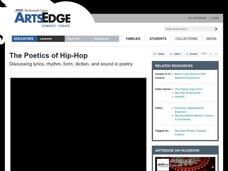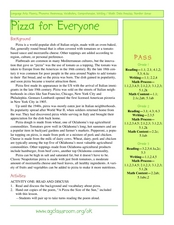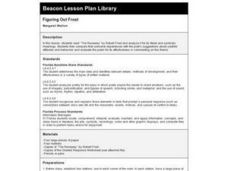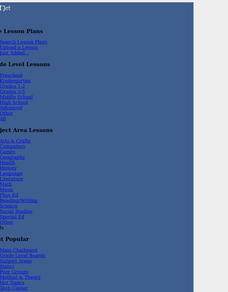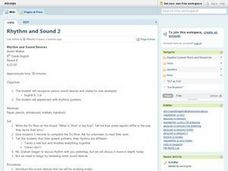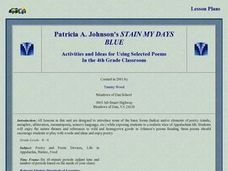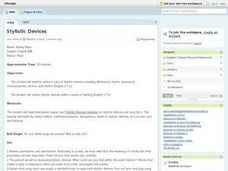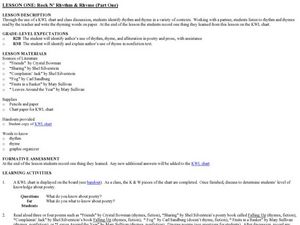Curated OER
Out of the Dust 1
Students review figurative languages terms and examples. They read the first entry in the book, Out of the Dust, and discuss the images created by the author. Then they create an autobiographical poem using figurative language.
Curated OER
Senior English Beowulf Test
The first thirty-seven questions on this assessment check for knowledge of the events in Beowulf. The short answer prompt asks readers to identify five characteristics of an epic and to give examples from Beowulf in support. Finally,...
Curated OER
Come Fly With Me...Aviation
Students conduct internet research on aviation and pioneer aviators. They create an alphabet book r with flight related terms, write a short biography of a pioneer aviator and take part in a paper plane flying contest.
Curated OER
Modern American Poetry
Students identify different types of literary terms in poems. They read different poems and create a packet summarizing them. They write a poem of their own and a biography of one of their favorite poets.
Curated OER
Identify Poetic Devices
In this poetic devices worksheet, students identify devices being used as alliteration, rhyme, onomatopoeia, rhyme, idiom, simile, metaphor, hyperbole or personification and explain their choice.
Curated OER
What's In A Name
Second graders read Chrysanthemum by Kevin Henkes. They then discuss where various names come from. They create a individualized biopoem and publish it on word processing software. Their poems are compiled into a class book and presented...
Curated OER
Pre-AP Strategies for Spanish Literature
Take a break from vocabulary development and have your Spanish scholars immerse themselves in Spanish culture. What are common Spanish proverbs? In short sessions over the course of a few weeks, the class will learn about different...
Poetry Society
Imaginary Words
Oh, what fun! Young logophiles and neologists create a dictionary-sounding definition for imaginary words and try to fool their classmates.
Curated OER
Focus on Figurative Language
Using the poems "First Snow" by Ted Kooser and "Eating Alone" by Yi-Young Lee (or other suggested poems by Robert Frost or Sara Teasdale), middle schoolers search for examples of figurative language. Guide your learners by discussing...
Curated OER
Language Arts - Sixth Grade
Sixth graders review the definition of adjectives and synonyms. Then, they produce a poem using as many of those words as they can. This language arts PowerPoint also reviews the elements necessary to construct a poem.
Curated OER
The Poetics of Hip Hop
High schoolers consider the role of rhythm, form, diction, and sound in poetry. In this integrated arts lesson, students discuss the attributes of poetry as they analyze Shakespearean sonnets, hip hop music lyrics, and poems by Nikki...
Curated OER
Dali & Desnos
Young scholars explore surreal art and poetry. In this visual arts lesson, students examine works by André Breton, Robert Desnos, Salvador Dalí, and Joan Miro. Young scholars then apply the techniques in the works they analyze to their...
Curated OER
A Prelude To Beowulf
Students study the literature and literary techniques of the early Middle Ages, thus preparing students to read Beowulf with an appreciation for its artistry and beauty. Students solve online riddles, write riddles and study Anglo-Saxon...
Curated OER
Pizza for Everyone
Pizza is the inspiration for the cross-curricular lesson detailed here. Start out with a poem about pizza and move into a discussion about balanced eating. To close the language arts portion of the lesson, ask your pupils to write...
Curated OER
Figuring Out Frost
Fourth graders read "The Runaway" by Robert Frost and analyze it for its literal and symbolic meanings. They compare their personal experiences with the poet's suggestions about youthful attitudes and behaviors. Some nice worksheets are...
Ohio Department of Education
A Glossary of Literary Terms
If you're tired of defining allusion, onomatopoeia, and satire for your language arts students, hand out a complete list of literary devices to keep the terms straight. Each term includes a definition that is easy to understand and...
Curated OER
A P Literary Terms
Is a list of literary terms found frequently on AP English exams of value to test takers? Now there's a rhetorical question. Here's a list that provides definitions for everything from allegory to vernacular. To say the list is of value...
Curated OER
Figurative Language Scavenger Hunt
Eighth graders analyze and interpret figurative language. They listen to some examples of poetry which use figurative language. Then, they divide into groups and attempt to find more examples. Finally, 8th graders write what the poet is...
Curated OER
Rhythm And Sound 2
Students review the concept of rhythm and this lesson looks at some specific sound devices in the study of music. They focus on assonance, consonance, and alliteration. Students define the concept of rhythm and give poetry as an example...
Curated OER
Stain My Days Blue
Students read several poems related to the life and culture of the Appalachia region. They are introduced to the poetic forms of simile, alliteration and onomatopoeia and respond to the poems through journal entries and poetry of their own.
Curated OER
Stylistic Devices
Students review connotation and denotation and stylistic devices in poetry. They read the lyrics to a song as it is being played and then discuss the meaning of the song. As a class, students read poems, share their thoughts, and...
Curated OER
Lesson Two: Rock N Rhythm & Rhyme (Part Two)
Second graders find rhythm and rhyme in poetry. In this poetry lesson, 2nd graders listen to different poems to find the rhyming words. They play a memory game and try to find two words that rhyme.
Curated OER
Lesson One: Rock N Rhythm & Rhyme (Part One)
Second graders listen to poetry to find rhyme and rhythm. In this poetry lesson, 2nd graders listen to different types of poetry and find how they are alike. They look for rhyming words and create their own rhymes.
Curated OER
Anglo-Saxon Period: An Introduction
High schoolers read information about Anglo-Saxon rulers and literary techniques, then complete a worksheet to help them review. Students take notes about the oral tradition, Anglo-Saxon literary terms, and Anglo-Saxon poetry. High...


